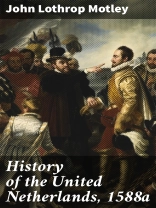In ‘History of the United Netherlands, 1588, ‘ John Lothrop Motley masterfully chronicles the struggle of the Dutch Republic against Spanish rule in the late 16th century. Written in a vivid literary style that reflects the passionate nationalism of the era, Motley’s work intricately weaves together political, military, and cultural narratives to highlight the complexities of the Dutch fight for independence. His detailed and analytical approach captures the fervor of a nation in ...
In ‘History of the United Netherlands, 1588, ‘ John Lothrop Motley masterfully chronicles the struggle of the Dutch Republic against Spanish rule in the late 16th century. Written in a vivid literary style that reflects the passionate nationalism of the era, Motley’s work intricately weaves together political, military, and cultural narratives to highlight the complexities of the Dutch fight for independence. His detailed and analytical approach captures the fervor of a nation in turmoil while situating this struggle within the broader context of European politics, particularly the conflict between Protestant and Catholic powers. Motley’Äôs extensive use of primary sources lends authenticity and depth to his historical account, making it an indispensable addition to both historical and literary scholarship. Motley, an American historian and diplomat born in 1814, was profoundly influenced by his own experiences traveling in Europe and observing the political ramifications of nationalism. His academic background in history and political science, coupled with a deep interest in the Netherlands’ fight for freedom, inspired him to offer this comprehensive account. His passion for the subject leads to an engaging narrative that not only informs but also captivates the reader with the earnestness of the Dutch struggle. This seminal work is highly recommended for anyone interested in European history, nationalism, or the intricate tapestry of the Protestant Reformation. Motley’s insightful narrative and rich historical detail provide a compelling lens through which to understand the formation of modern Europe. Readers will find that this book not only serves as an essential historical text but also stimulates thoughts about the enduring consequences of war and the fight for liberty.












